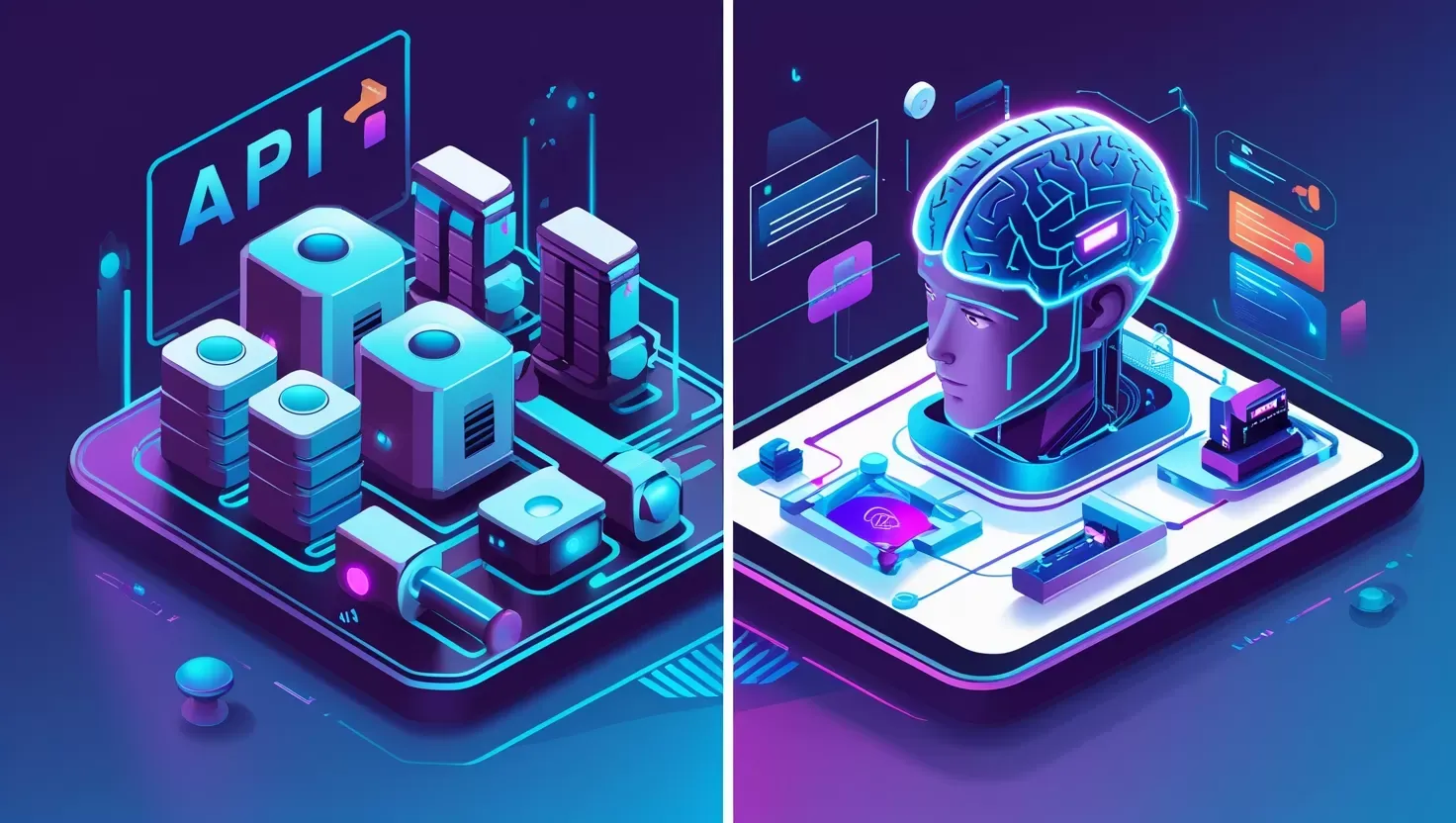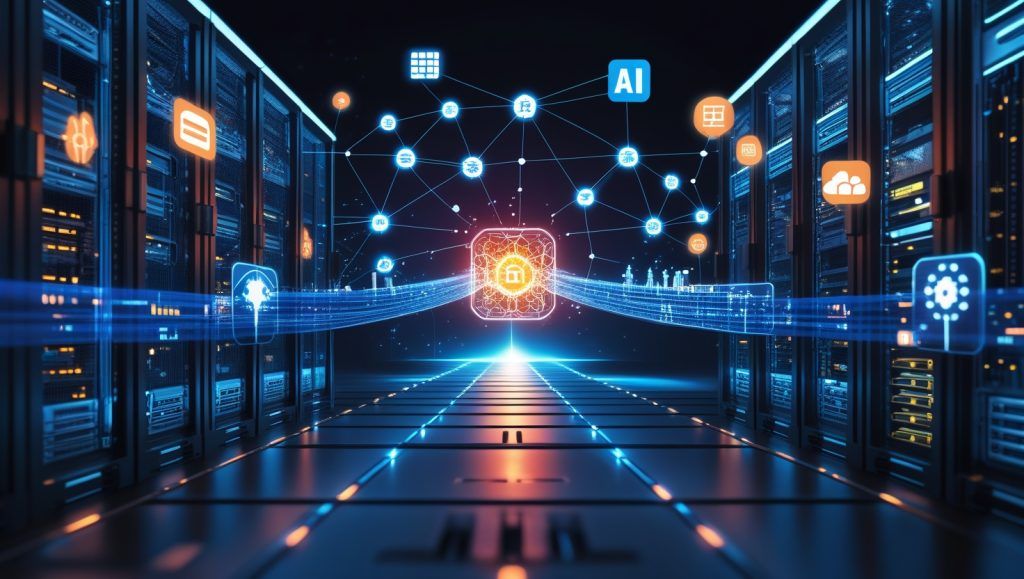MCP vs. API: Understanding the Future of AI Integration
GALTech School of Technology Private Limited > Blogs / MCP vs. API: Understanding the Future of AI Integration

With the ubiquity of AI technologies, systems’ interaction via data communication is changing rapidly. Every software engineering discipline employs two major techniques: legacy API servers and a new Model Context Protocol (MCP) under development. Although APIs have served their purpose during a given period of time, MCP was tailored for modern requirements. This blog discusses the purposes for which MCP vs. API should be used while analysing their key differences, as well as how both can be integrated to create more intelligent applications.

What Is an API Server?
An API Server is a peripheral system for an organisation that enables interfacing with other organisational systems through protocols exposed on designated boundaries. An API processes structured commands to retrieve system elements, e.g., user extraction, components invocation and messaging/calling functions and returns pre-defined result sets according to templates provided in the contracts. Such interfaces are extensively found in numerous applications, from mobile and e-commerce to enterprise systems across industries.
API servers are valued for their well-established reliability and long-standing industry support. With years of evolution, APIs now benefit from a vast array of developer tools, libraries, and best practices, making them dependable and perfect for stable integrations.
Yet, API servers do not maintain state. Each interaction is handled as a distinct event, and previous requests are ignored. While this is beneficial for most computer programs, it becomes an obstacle in AI-driven applications where context, memory, and adaptability matter the most.
What Is MCP (Model Context Protocol)?
MCP focuses on integrating various components into an AI model with more sophisticated layers of intelligence, such as large language models (LLMs). It is more intelligent than APIs because it is able to remember contextual details of conversations. AI agents can recall previously stored interactions, allowing them to carry on dialogues from where they left off, making decisions based on the changing contexts.
MCP suggests that development assumes integration by considering the Model Context Protocol as its base structure, thus making it not just another protocol. Instead of hard-coding designated framework intersections or endpoints, MCP gives freedom for AI agents to intelligently navigate through the available tool set and autonomously determine their application without needing additional programming steps, which makes functions change flexibly, thus adaptable, rendering systems powered by artificial intelligence devoid of constraints imposed by time.
For example, an AI agent using MCP could adapt to a new database or API without the developer explicitly programming for that change. The agent learns and interacts in real-time, making the system far more flexible than traditional software approaches.
MCP vs. API: Key Differences
When comparing MCP vs. API, it’s important to understand that they serve different needs.
APIs are designed for deterministic, predefined operations. They are perfect for tasks that require clear, consistent behaviour—like submitting a form, updating a product inventory, or processing a payment. APIs are dependable, but rigid. Every change in the API structure often requires updates in the client application.
In contrast, MCP is built to support adaptable and intelligent interactions.It enables AI agents to hold context, remember what has been discussed, and adapt to new tools or data sources dynamically. It’s like giving your software memory and decision-making ability.
In essence, the API server provides access to functionality, while MCP provides the intelligence to decide how and when to use that functionality in a broader, evolving context.
How MCP and API Work Together
The debate around MCP vs. API doesn’t imply that one replaces the other. In fact, MCP consumes APIs. An MCP server can act as a layer between an AI model and various traditional APIs. It abstracts the underlying APIs and presents them in a way that AI agents can understand and use intelligently.
MCP effectively connects advanced AI capabilities to traditional infrastructure. While APIs continue to provide the backend capabilities, MCP enables intelligent interaction with those services.
For example, instead of directly calling an API to retrieve weather data, an AI agent using MCP can ask, “What’s the weather like tomorrow?”MCP handles incoming requests, fetches the required data via APIs, interprets the results, and continues the interaction smoothly within the ongoing context.
When to Use MCP or API
Use traditional APIs when:
- You need structured, reliable, and repeatable operations.
- The data or functionality you’re accessing doesn’t change often.
- Your integration doesn’t require memory or context awareness.
Use MCP when:
- You’re building AI-powered applications or agents.
- It’s essential for your system to adjust dynamically as tools, inputs, or operational flows change.
- You need a persistent conversational or context-aware interaction.
In most modern use cases, a hybrid approach works best. Use APIs to provide the core services, and MCP to enable intelligent, dynamic interaction with those services.
Conclusion: MCP vs. API in the Age of AI
As AI transforms how we build and use software, the tools that support it must evolve too. APIs have served the software world reliably for decades, and they will continue to do so. But in an AI-driven environment, where adaptability, reasoning, and memory matter, Model Context Protocol (MCP) offers a powerful new layer.
Instead of viewing MCP vs. API as a competition, it’s more useful to see them as partners. MCP enhances what APIs can do by making their functionality more accessible to AI agents in a context-aware, conversational way.
For developers, startups, and enterprises looking to build AI-native systems, the key lies in combining the stability of APIs with the intelligence of MCP. Together, they form the foundation of the next generation of smart, adaptive digital experiences.
At GALTech School of Technology, we equip students and professionals with the skills needed to thrive in today’s rapidly evolving tech landscape. Our expert-led programs in Artificial Intelligence, Data Science, Full Stack Development, Data Analytics, and Digital Marketing are designed to bridge academic learning with real-world application. Whether you’re mastering traditional APIs or exploring cutting-edge protocols like MCP, GALTech ensures you’re prepared for the future of intelligent software development.
Ready to build AI-powered solutions? Enroll today at GALTech and future-proof your tech career.
call:+91 70127 16483
Leave a Comment
Recent Posts

Jan 22, 2026



